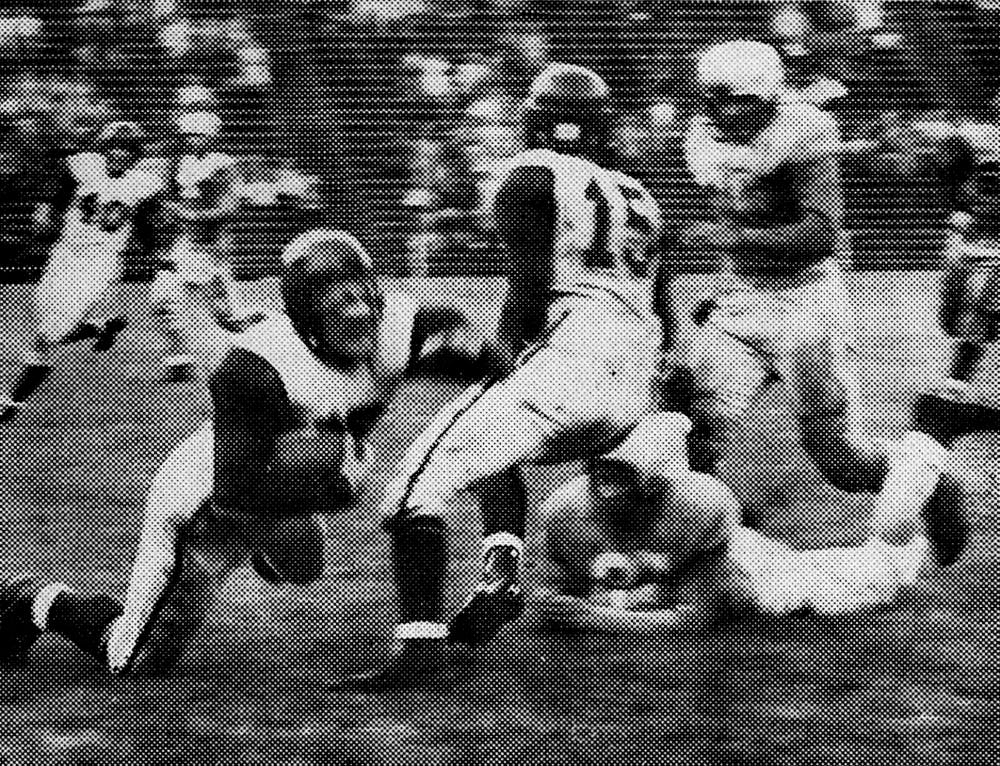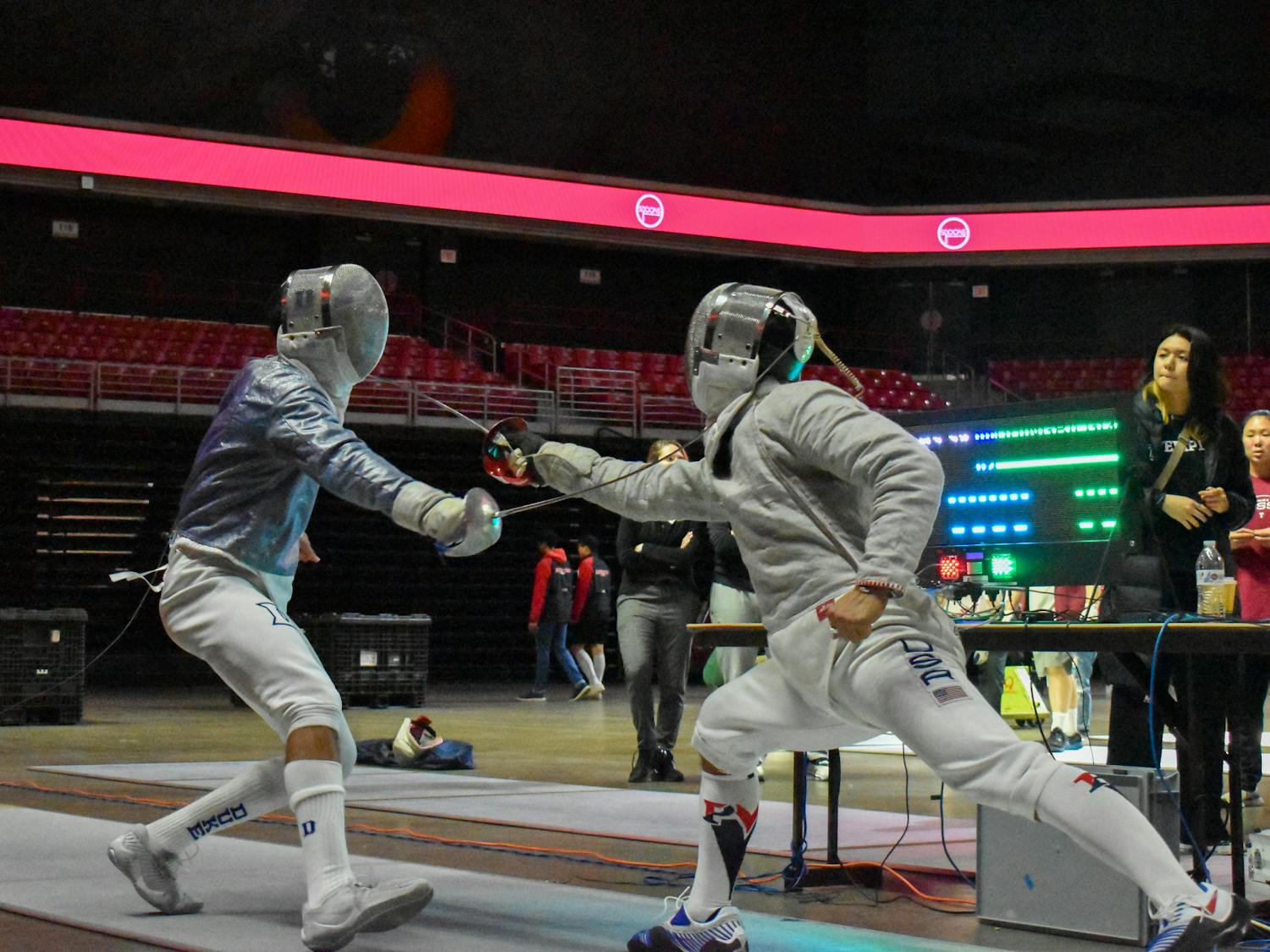If you listen closely, you still might be able to hear the echoes of the cannon.
Sixty years later, the story may be forgotten, but the magic remains. This weekend, members of Penn’s 1959 Ivy League title-winning football team gathered in the venue they once played in to celebrate the 60th anniversary of their historic season. The group's championship would mark Penn’s first Ivy League triumph and its only title until 1982.
A national powerhouse for much of the 1940s, the Quakers began a downward spiral after the resignation of College Football Hall of Fame coach George Munger in 1953, going 11-34 in new coach Steve Sebo’s first four years at the helm. However, entering the 1959 season, the Quakers had confidence that this would be the year they would turn their fortune around.
“Before the season started, I wrote the team a note that said, 'you gotta come out of the shoot and knock off our first three opponents,” captain and wide receiver Barney Berlinger said. “We needed to come to Hershey in shape, not try to get in shape at Hershey.”

The team heeded Berlinger’s words, winning three straight in shutout fashion over Lafayette, Dartmouth, and Princeton, outscoring its opponents by 57 points. The win over Princeton was Penn’s first victory against its rival since 1952. After taking care of Brown, 36-9, the following week, the team was set for its next major challenge, a matchup against No. 4 Navy on a muddy afternoon at Franklin Field.
“Navy was the peak, the psychological peak,” Berlinger said.
Despite entering the contest as heavy underdogs, the Quakers jumped out of the gate by taking a 19-8 lead early in the game. The Midshipmen would not go down quietly, however, rattling off 14 straight points to take a 22-19 lead late in the fourth. The Red and Blue had one final push left in them, driving down the field and allowing Ed Shaw to connect on a 24-yard field goal, ending the game in a tie.
“After we tied Navy ... we thought this was going to be our year,” quarterback George Koval said.
“The fact that we only tied may have been a psychological letdown, and it showed right on Franklin Field the next Saturday with Harvard when we lost 12-0, ” Berlinger said.
The loss to Harvard put a dent in the team's title chances. Nevertheless, the Red and Blue were able to get back together and comfortably defeat Yale and Columbia in the next two weeks, setting up a chance to clinch the conference championship on Thanksgiving Day with a win over Cornell.

“We were behind, 13-0, with only 17 minutes left in the ballgame when George Koval threw a short pass to Jack Hanlon, who got into the end zone,” Berlinger said.
“I was flat on my back after I threw that pass to Hanlon,” Koval said. “I didn’t know what happened until I heard the cannon go off [to signal the Penn touchdown].”
“Then there were only about seven minutes left in the ballgame when Koval threw another short pass to Hanlon, who ran down to the Cornell 30,” Berlinger said. “If Jack Hanlon would have dropped that pass or if Koval had misfired, we were done.”
With the Quakers now deep in Cornell territory, they had put themselves in a position to complete the unlikely comeback, but they would need one more miracle to make their title dreams a reality.
“It was fourth and 26 on the Cornell 30 — fourth and 26 — and Koval fires a long one to me in the end zone,” Berlinger said.
“I jumped as high as I could in the air and caught the pass and came down. The thing I remember was the cannon going off because I had tried to keep my feet in bounds ... so the cannon put us up, 14-13. After that second touchdown, all the wind came out of Cornell's sails," Berlinger said to the DP in 1999.
With Cornell demoralized by the comeback effort, the Quakers would go on to score two more quick touchdowns to put them ahead by a score of 28-13 and clinch the team’s first Ivy League title.
“It wasn’t a letdown, but it took an awful lot of hard work,” Berlinger said. “It was wonderful to taste that, but it took an awful lot out of us to get there.”
While the team may have felt some relief to just have the season and expectations over with, the fans were busy celebrating.
“The fans were rabid. After every win, the goalposts always came down," Berlinger said. "Now what happened after that, I don’t know."
"They were wooden goalposts, so people would just snap them off, carry them over, and throw them in the Schuylkill," Koval said in 1999.
After the season, the team and school had high expectations for the program moving forward, hoping that Penn football would once again move into the national spotlight. Yet despite a championship season, the team returned to find out that Sebo would not be returning as head coach in 1960. Penn Athletics had decided before the 1959 season began that the coach would not be returning after the the season, no matter what.
“We thought [the championship] was going to set the program forward,” Koval said. “When we got home the next day, we learned they had fired our coach, and so while the season may have been a positive moment for us, it probably set the program back about five or 10 years.
“The irony of it was when he was hired he said five years and he would bring us a title. In the fifth year the title came, but he was gone.”
With the program once again in a period of transition, the Quakers struggled to find success under new coach John Stiegman. The team went just 3-6 in 1960, and it would be another 22 years before the Red and Blue topped the Ivy League again.
Despite the fact that it was just one season in an otherwise difficult era for Penn football, the magic of the 1959 title is still one of the most important moments in the program's history.









